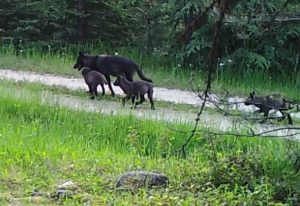 Loyalty to Ranchers isnt what is Needed!!
Loyalty to Ranchers isnt what is Needed!!
It is Loyalty to Our Childrens Resources that is, which is mandated upon WDFW.
Well to begin with this isnt the first time! Secondly, How long will Jay Inslee, Washington State’s Governor allow this Special Interest Rancher back patting to continue? They have Ignored Our Request to Join their Range Rider Program for years.
WDFW is NOT doing even close to what is expected of them which includes managing the Resources for All of the Public, not these Self Proclaimed Self Entitled Old West Mentality Holders.
Please Join Our Movement to Close these Offending Ranchers Allotments using Tribal Cultural Reasons while we still have Wolves Left, and Get Our Precedent Setting Research into the Courts! https://continuetogive.com/protectthewolves
From Source: For the first time, a cattlemen’s group will receive state money to help ranchers avoid conflicts with wolves in four northeast Washington counties.
With the $144,908 grant, announced Wednesday, the Cattle Producers of Washington will put people in the field to work with ranchers in Ferry, Okanogan, Pend Oreille and Stevens counties.
“They will have loyalties to the rancher,” Cattle Producers President Scott Nielsen said. “We want them to have credibility with the ranchers, so ranchers will use them.”
The Northeast Washington Wolf-Cattle Collaborative was also awarded $189,492 to monitor herds in wolf territories. The grants were announced by the Washington State Department of Agriculture.
The Legislature created the program two years ago to give “community-based” organizations a shot at preventing wolf attacks on livestock.
A year ago, the Cattle Producers submitted a plan endorsed by county sheriffs and commissioners. The Department of Fish and Wildlife, however, criticized the proposal, and the committee that reviewed the applications rejected it.
Fish and Wildlife spokeswoman Staci Lehman said Wednesday that the department welcomes help from the Cattle Producers. “Whether it’s with us or with them, as long as ranchers are working with somebody, great,” she said.
The Cattle Producers applied for $210,600 to hire conflict specialists and buy equipment, including trail cameras and horse trailers. Nielsen said he thinks the group will be able to trim its budget and still cover the four counties.
Nielsen said he anticipates conflict specialists will keep ranchers informed about wolves in their area. He also said he expects they will keep watch on depredation investigations by Fish and Wildlife.
“I think we can get ranchers to do what’s expected of them. In return, we want the department to do what’s expected of it,” he said.
The Northeast Washington Wolf-Cattle Collaborative received a similar-sized grant last year. The director, Jay Shepherd, said the group mostly employed people this summer in the Kettle River Range, a hotspot for depredations that led to the lethal removal of wolves.
“It’s a tough neighborhood to have success,” Shepherd said. “One problem with doing what you hope to do is wolves don’t do what you hope they would do.”
In the future, herd monitors may be more useful in keeping packs from developing a taste for cattle, he said.
“Once they’re habituated toward cattle, it’s hard to break,” Shepherd said.
Fish and Wildlife eventually resorted to shooting eight wolves in the OPT pack. Department Director Kelly Susewind has authorized removing the Togo pack’s two known wolves. So far, no wolves have been removed.
Shepherd, a former Fish and Wildlife biologist, said protecting livestock from wolves is “more complicated than people think.”
“Given the political climate of the state, do we have a choice but to figure it out? I’d say ‘no,'” he said. “So let’s have a concerted effort to determine what’s effective.”
A board representing conservation districts in the four counties reviewed the applications and awarded the grants.
Three other organizations applied but did not receive funding. The department distributed all the money appropriated by lawmakers, keeping $17,600 for administering the program.